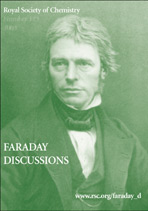Faraday Discussions
Farad. Discuss. doesn't exist. |
Farad Discuss doesn't exist. |
 | |
| Discipline | Physical chemistry, chemical physics |
|---|---|
| Language | English |
| Edited by | Philip Earis |
| Publication details | |
Former name(s) | Faraday Discussions of the Chemical Society |
| History | 1947-present |
| Publisher | Royal Society of Chemistry (United Kingdom) |
| Frequency | 6/year |
| 5.000 (2011) | |
| Standard abbreviations | |
| ISO 4 | Farad. Discuss. |
| Indexing | |
| CODEN | FDISE6 |
| ISSN | 1359-6640 (print) 1364-5498 (web) |
| LCCN | 74642310 |
| OCLC no. | 40343517 |
| Links | |
Faraday Discussions is a scientific journal publishing original research papers presented at a long-running series of conferences on physical chemistry, chemical physics and biophysical chemistry which are also called Faraday Discussions, together with a record of the comments made at the meeting. The journal was originally published by the Faraday Society. The journal has been published by the Royal Society of Chemistry (RSC) since that society merged into the RSC. From 1972 to 1991, it was known as the Faraday Discussions of the Chemical Society. Traditionally there have been three Faraday Discussions a year, however, from 2011 six conferences (and therefore six volumes of the journal) are organised annually.
Philip Earis is the editor of Faraday Discussions and the present chairman of the Standing Committee on Faraday Conferences is Andy Mount (University of Edinburgh). The journal has a 2011 impact factor of 5.000.[1]
History of Faraday Discussions meetings and publications
The Faraday Discussions are held from April to September, with the majority held in the United Kingdom, although at least one annually is held overseas. Proofs of the 20-25 invited and contributed selected papers are circulated to participants well in advance of the meeting. Since each paper has been read in advance, the actual meeting is able to concentrate on debate. The whole of the proceedings is subsequently published including submitted discussion remarks which include those that "the contributors said, think they said, or wished they had said!".
There are well established links with a number of European societies, including the Division de Chime Physique of the Société Française de Chimie, the Deutsche Bunsen Gesellschaft, and the Società Chimica Italiana. Joint European meetings are held and there are international relationships worldwide both at Divisional and Specialist Interest Group level.
References
- ^ "Faraday Discussions Home-Discussion summary and research papers, in physical chemistry, chemical physics and biophysical chemistry". Pubs.rsc.org. Retrieved 2012-09-24.
